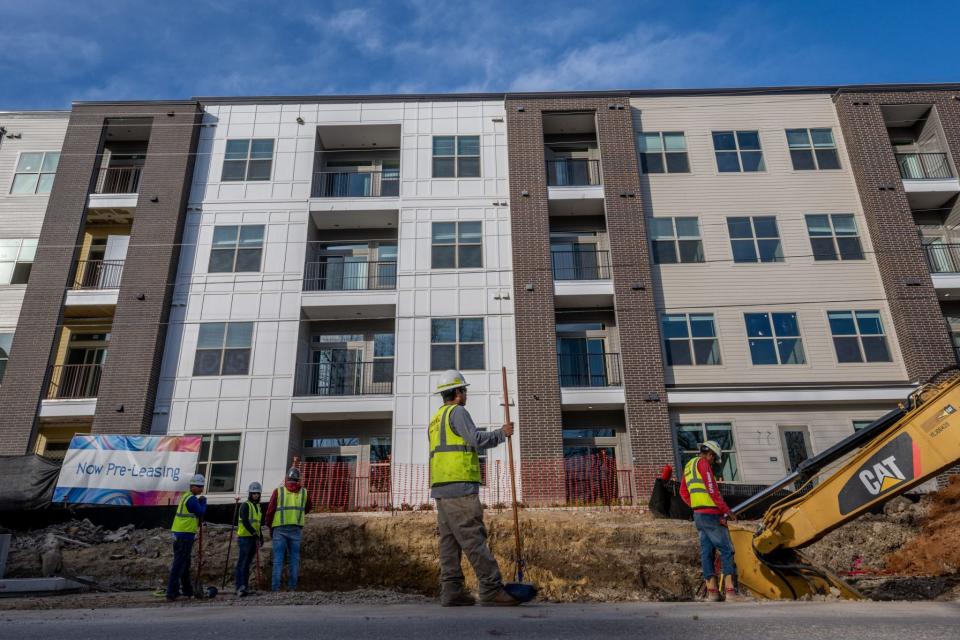Builders are pumping the brakes on new apartment construction—but landlords will keep ‘jacking up’ rental prices

The U.S. housing market is short 4.5 million homes, according to recent Zillow estimates, which is worsening the affordability crisis for renters and homeowners alike. Indeed, half of renters are cost-burdened, spending more than 30% of their income on monthly rent.
“We are in a big hole, and it is going to take more than the status quo to dig ourselves out of it,” Orphe Divounguy, senior economist at Zillow, said in a statement. But builders aren’t doing much to bridge that gap and are pumping the brakes on new apartment construction.
Permits to build multifamily housing units dropped 30% this year, according to a Redfin analysis released Tuesday.
This year, builders obtained permits to construct just 13 multifamily housing units for every 10,000 people in the U.S.
Redfin says builders have slowed their pace this year because higher interest rates have made it more expensive to borrow money for construction projects.
What’s more, it’s been surprisingly difficult for some property owners to find tenants. Indeed, just 47% of new apartments that were completed at the end of 2022 were rented within three months, according to Redfin.
That’s the lowest share since 2020.
In turn, landlords have started offering concessions including a free month of rent, discounted parking, or other deals to sign a lease on the spot. But that may not last for long, Redfin warns.
“Prospective renters should be aware that now may be a better time to sign a lease than later,” Sheharyar Bokhari, a senior economist with Redfin, said in a statement.
“Property owners might start jacking up rents again once all of the new apartments hitting the market fill up with tenants and there’s no longer so much supply, which could be the case in a year or two.”
The cost of construction
While it may seem counterintuitive that builders would be backing off from new construction while housing supply remains low, it’s a matter of cost that’s slowing them down.
Inflation still rages on, with interest rates still above 5%. That makes it much more expensive to build new homes—and less attractive for builders.
What’s more, materials costs are elevated, and the lumber tax is expected to continue to rise.
“Builders are holding back because the economics of new construction do not work in most markets,” Ryan Reich, real estate developer and chief investment officer of Mountain Shore Properties, previously told Fortune.
“Yes, supply is low, but the cost of construction is still quite high, and high interest rates and the general lack of credit available have made it almost impossible to build.”
Plus, it’s more difficult for builders to find affordable financing options for new builds, and there’s less available land to buy for constructing new housing units, Kori Sassower, a team head and real estate agent with Compass who focuses on new construction, previously told Fortune.
“Ultimately, builders aren’t holding back because they don’t believe the demand is there,” Sassower says. “The issue is that they don’t have enough supply and financing is making building prohibitive.”
Landlords could end up cashing in
While it’s been a challenge for some landlords to fill vacancies, that won’t last for long.
While multifamily building permits and starts have slowed, the number of units being completed is still at historic highs, according to Redfin.
Many of the projects started during the pandemic are now just being completed, which is leading to more competition among landlords.
But eventually, the lack of housing starts will catch up to these extra units.
Indeed, “landlords may feel empowered to jack up rents in the coming years once the slowdown in permitting trickles down to actual inventory,” according to Redfin.
While asking rents are up less than 1% from a year ago, they’re still nearly 19% higher than they were pre-pandemic, according to a Moody’s Analytics CRE report released in May. That’s led to more landlords cashing in—and now, according to the Institute for Policy Studies, there are 61 billionaire landlords in the U.S. with collective wealth totaling $240.9 billion.
However, it’s always important to remember that housing is a particularly localized subject, and it’s nearly impossible to draw country-wide conclusions about the rental market's direction.
“Cities that are experiencing rapid growth and gentrification may see an increase in rent prices as demand for housing outstrips supply,” Itay Simchi, founder of real estate investment company Proven House Buyers, tells Fortune.
“On the other hand, cities that are facing declining populations or economic stagnation may see rent prices stabilize or even decline as there is less demand for housing.”
This story was originally featured on Fortune.com

 Yahoo Finance
Yahoo Finance 